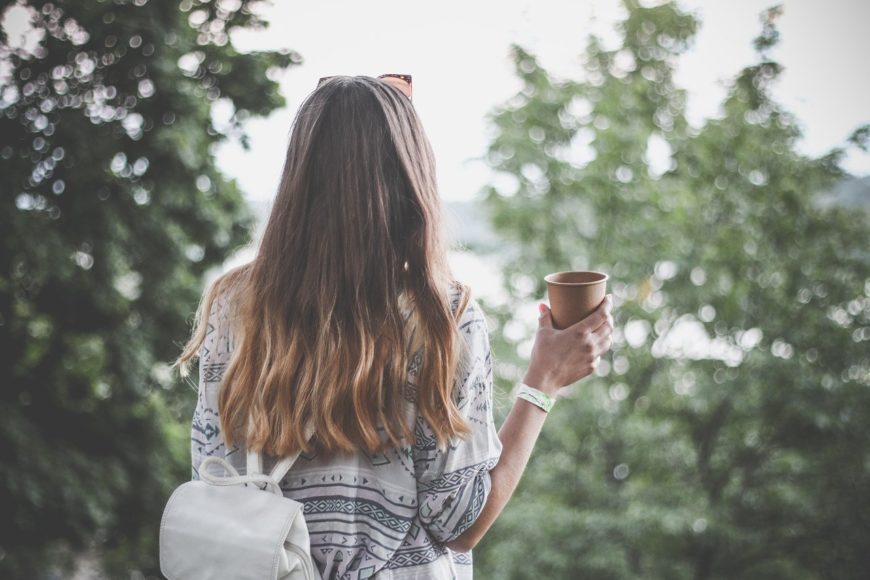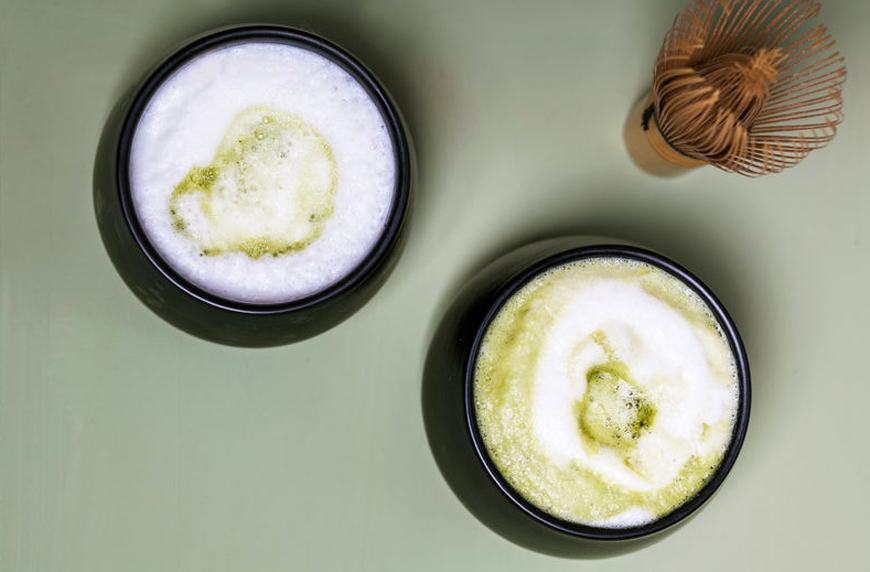Well + Good writer Mercey Livingston details her personal story on how her health was affected by heavy coffee caffeine consumption (say that 10x fast!), her journey to that realization, and what she did to help her body break the cravings. Enter, matcha!
"I loved the smooth, sustained energy I got from matcha—I never felt jittery or overly stimulated, like coffee sometimes made me feel, and there was no crash-and-burn feeling afterward. If I was having a stressful day, coffee seemed to add fuel to the fire and make me feel ten times more anxious. But that was never the case with green tea, thanks to its relaxation-promoting l-theanine and other good-for-you antioxidants."
You can read Mercey's full article: I Had an Unhealthy Relationship with Coffee - Here's How I Healed it on Well + Good.
---------------
I HAD AN UNHEALTHY RELATIONSHIP WITH COFFEE—HERE’S HOW I HEALED IT
To say that I love coffee would be a total understatement. (Seriously, just check my bio.) I’ve always been that girl, the one who couldn’t function without a cup of java first thing in the morning. You know those memes that say, “But first, coffee”? That’s basically my life mantra.
And, it wasn’t just a once-a-day habit. Every day, I craved another coffee at 10 a.m., and then usually again around 3 or 4 p.m. The thought of going even one day without it—and enduring the inevitable headaches, brain fog, and other caffeine withdrawal symptoms—made me cringe. I was sure that if I stopped drinking coffee, I wouldn’t be able to get any work done, let alone hit the gym or be pleasant at a social event.
And, to be totally honest, I wasn’t convinced that I even needed to cut back on coffee, despite all of the things I’ve read about the potential side effects of too much caffeine. I drank mine organic with coconut cream or almond milk, and sometimes even added collagen or drank it Bulletproof style. A #wellnesswin, right? Turns out, not exactly. (At least, not for me.)
No matter how much caffeine I consumed, I always felt tired and even started resorting to energy drinks just to give me a jolt.
Fast forward about six months after I moved to New York City, where people hold coffee cups like fashion accessories when they walk the streets. No matter how much caffeine I consumed, I always felt tired and even started resorting to energy drinks just to give me a jolt. When I started developing hormonal issues and problems with my period, I knew something wasn’t right with my body. I started taking adaptogens, thinking they would counter some of the effects of stress and caffeine, but I didn’t feel much different. Then, my doctor suggested I run some tests, and it turned out that I had a vitamin D deficiency and possibly polycystic ovary syndrome (PCOS). I also suspected that I had adrenal fatigue, but the possibility of having PCOS alone was enough to make me reconsider my habits.
I decided I needed to change some things in order to get my body back into balance. I’d heard about Dr. Alejandro Junger, founder of the Clean Program, and decided to try his much-loved, 21-day detox plan. Besides being the go-to health guru of celebs like Meghan Markle, Gwyneth Paltrow, and Naomi Campbell, I was really into his overall wellness philosophy and intrigued by his experience as a cardiologist-turned-functional medicine expert. So I decided to dive head-first into the detox, which of course, required me to give up coffee.
Keep reading to find out what happened when I quit coffee for 21 days.
Why can’t you have coffee on a detox?
The Clean Program is basically an elimination diet, where you stop eating foods that commonly can cause problems. These include dairy, sugar, alcohol, gluten, eggs, nightshades, strawberries, and—worst of all for me—coffee (even decaf).
Well, there’s a good reason why coffee isn’t allowed on the Clean Program detox. “People become dependent on it,” Dr. Junger tells me. “It’s such a strong stimulant, and after a while your adrenals become exhausted. Thinking gets affected, energy levels get affected, the way your liver works, the way your hormones are produced or not. And all kinds of imbalances are born from that.”
By nixing coffee during the 21-day program, your body theoretically has the chance to start fresh. “Quitting coffee, whether long-term or during a cleanse, gives your adrenal glands a chance to breathe and reset,” says Tiffany Lester, MD, Medical Director of Parsley Health San Francisco. “If you’re drinking coffee to fuel your mornings, its time to investigate why you are fatigued in the first place. This artificial fuel is likely masking underlying imbalances in your hormones, mitochondrial dysfunction, or adrenal fatigue.”
How I got over my caffeine withdrawal symptoms
Once I was committed to doing the program, I knew I wanted to go all in, which meant for the first time in nearly 10 years I would say goodbye to my constant morning companion. And I’m not gonna lie—the first days without coffee were rough. I felt like I was getting the flu for almost a week. I also had brain fog and was in a bad mood most of the time. Not fun.
After a few days of lots of naps, chugging water, and drinking green juice to ease the withdrawal symptoms, I finally started feeling good again. I also started drinking matcha for a gentler caffeine fix—but let me tell you, finding a good-quality matcha that doesn’t break the bank is really hard. After a few false starts, I started Googling and found Mizuba Tea, per blogger Alison Wu’s suggestion. It’s organic, tastes smooth, and works great for matcha lattes. Best of all, Mizuba ships fast. Like, Amazon Prime fast. (Ideal if you live in a wellness desert with no Cha Cha Matcha or Matcha Bar in sight.)
By week two of the program, I felt totally different. I loved the smooth, sustained energy I got from matcha—I never felt jittery or overly stimulated, like coffee sometimes made me feel, and there was no crash-and-burn feeling afterward. If I was having a stressful day, coffee seemed to add fuel to the fire and make me feel ten times more anxious. But that was never the case with green tea, thanks to its relaxation-promoting l-theanine and other good-for-you antioxidants.
What I learned from quitting coffee—and starting to drink it again
One of the biggest things that I realized from this experience was how much I relied on coffee as a crutch. I used it to help me wake up, as a pre-workout energizer, as a mood-booster, and pretty much any time I felt tired, unfocused, or was procrastinating something. It was amazing to finally realize that I didn’t actually need it to write, work out, or be in a good mood. I can be me without coffee. (And, yes, even survive one of my busiest work weeks of the summer—which thankfully, didn’t happen during the full-on withdrawal symptoms.)
Something that kept me going through the 21-day program was knowing that I could have my coffee again on day 22. I knew that, realistically, I would go back to it eventually, so I wanted to have a better understanding of how it really affects my body.
According to Dana James, a board-certified nutritionist, functional medicine practitioner, and cognitive behavioral therapist, figuring out if (and how) coffee works for you all comes down to how you metabolize it. Since your genetics play a role in this process, you can get genetic testing done to find out, or just drink some coffee and assess the way you feel. If you metabolize it quickly, you’ll generally feel pretty good if you stick to a cup a day, James explains. But if you’re a slow metabolizer, caffeine (and the adrenaline and noradrenaline it produces) stay in the body longer, which can create anxiety.
It was amazing to finally realize that I didn’t actually need it to write, work out, or be in a good mood. I can be mewithout coffee.
“You’ll know if you’re a slow metabolizer of caffeine because you’re like, ‘Oh my goodness I have a cold brew and I feel completely and utterly wired. It makes me feel jittery,” James says. We figured out that I’m most likely a slow metabolizer of caffeine. Even though I had built up a high tolerance to coffee pre-detox, even then I would feel instantly jittery from a cold brew. And this was confirmed even more when, the day after I completed the Clean Program, I tried to drink coffee and couldn’t even finish half the cup without my heart racing and feeling a bit crazy.
Now, per James and Dr. Junger’s guidance, I try to stick to one coffee a day. James suggested that I try medicinal mushroom coffee, which has a much better, jitter-free effect on me. I know it may seem a bit counterintuitive to do a coffee detox just to go back to it again, but I just love coffee too much to give it up for good. Moving forward, if I ever find myself drinking it in excess, I know what to do to reset my energy levels.
Plus, coffee isn’t something that’s categorically “bad” or “good” for all people. Unlike processed sugar, for example, coffee does have quite a few health benefits. Like anything else, the only way to tell if it’s right for you is to experiment and see what works. And if you learn that that coffee’s not the BFF you once thought it was, just know you certainly can rule the world without a latte in hand.
Article written by Mercey Livingston for Well and Good










Leave a comment